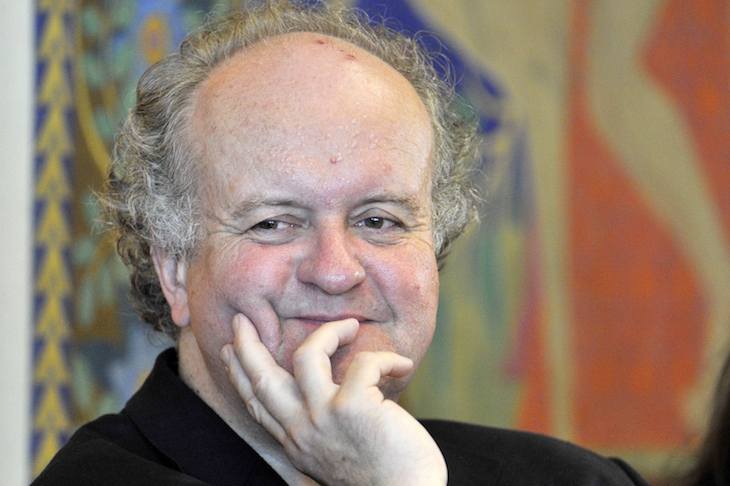The two Proms concerts given on consecutive evenings by the Royal Concertgebouw Orchestra were well planned: a short opening work, and after the interval a long and demanding symphony. Moreover, the big symphonies were by Bruckner and Mahler, to the latter of whom this orchestra has been devoted almost since its foundation. Willem Mengelberg, the orchestra’s chief for 50 years, was the only conductor, Mahler said, that he could trust with his works, and the orchestra has been headed by a succession of distinguished Mahlerians ever since.Bruckner, meanwhile, entered the orchestra’s repertoire in a major way in the 1950s, and has been there ever since. Daniele Gatti, who became the orchestra’s seventh chief conductor last year, was making his first Proms appearance in that role.
Wolfgang Rihm’s In-Schrift (1995), with which the first concert began, is a striking piece, with much for the percussion and low brass to do, and for the prominent harps, but no upper strings. I have tended to think of Rihm as a middlebrow composer who writes music that appeals to people who think it is highbrow; possibly I am one of them, but I haven’t usually liked his work as much as I enjoyed In-Schrift, with its blatantly Fafner-ian passages and its exquisite ending, which made me want to hear it again immediately.
I’m glad I didn’t, for after the interval came one of the most demanding works in the repertoire, Bruckner’s Ninth Symphony, a work with which I am obsessed. Each time I listen to it I am more than ever convinced that it is one of the greatest musical works, and more than ever bewildered as to precisely what its greatness consists of — not that there is any reason for doubting, but it remains so original, so unlike any other work, even other works by Bruckner, that bafflement is an unusually large ingredient in my awe.
That felt as if it was the general response from the audience, which was absolutely silent throughout, even between movements, and didn’t applaud for some time at the end. That end — interesting that in the programme book it receives consideration from two writers: Stephen Johnson claims, ‘At last the coda brings a sense of peace and long-sought tonal stability,’ while a couple of pages further on Tom Service writes, ‘The awesome power of this moment [the violent dissonance followed by silence] is completely unresolved by the end of the movement.’ I agree with Service completely, and so, I feel, did Bruckner, which leads one to be glad that he didn’t manage to complete a final movement, though there is a whole industry of musicologists engaged in trying to help him out, all with disastrous results. The symphony, according to Bruckner’s doctor, was to be dedicated ‘to the dear God’, but what Bruckner wrote, and completed, suggests that the ways of the dear God were ever more mysterious to him. All those characteristic silences in the Ninth are more pregnant than in the previous symphonies, where they signal that Bruckner is gathering his forces for the next musical period; in this Symphony alone they seem to indicate that he hardly knows how to search for whatever he hopes to find.
The big symphony the next evening seemed to me even smaller than it usually does. Years ago, when I first listened to Mahler, it was his only work played with any regularity, at least in England. It had in its favour, in those days, that it was comparatively short, though the First is even shorter, and much more attractive. There was, too, Mengelberg’s recording of the Fourth, which remains miraculous and, by current standards, wildly eccentric. I wish I found it less annoying as the years go by, but those merry sleigh bells and the smoochy main subject of the first movement bore and repel me, and it is only the third, slow movement that I can get any satisfaction from, and even then not very much.
Gatti’s reading, as indeed his reading of everything he conducted, was a model of lucidity. I heard this second concert at home on the radio, and to my surprise the orchestral balance and detail were no better than they had been for Bruckner in the hall. The Mahler is, in any case, his least heavily scored, though to call it ‘chamber-like’, as commentators often do, is stretching it. The last movement, the child’s vision of heaven, was sung with the right sort of bell-like tone by Chen Reiss, but her words were indistinct. For once I wished that I was listening to one of the longer Mahler symphonies. It had been preceded in the first part by Haydn’s Symphony No. 82, The Bear, which was given a gloriously rowdy performance, almost riotous, and with just the right orchestral strength for its venue.
The Bruckner, by the way, was the only one of his works in the whole Proms season, while of course there were five by Mahler.






Comments